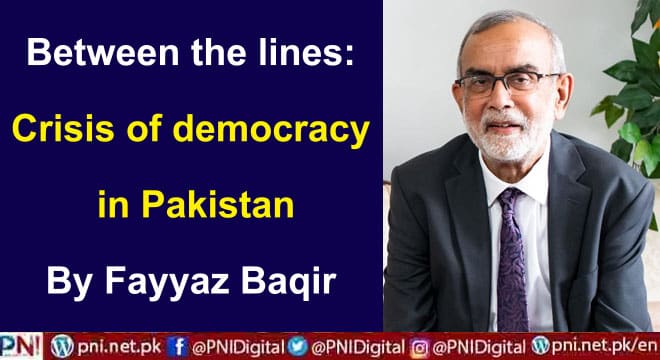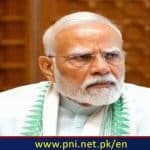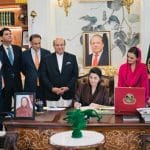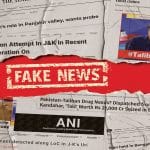The use of violence to settle political differences has brutalized our society, perpetuated injustice, and enabled various mafias to rob the people of Pakistan. Ideological positions have become irrelevant in this conflict. Secularism, Islam, democracy, socialism, and patriotism, every currency has been used to short-change the people. Both state and non-state power have been used to subdue the parties in the opposition. Unfortunately, the basic conflict as aptly said by former Foreign Secretary Shamshad Ahmad has turned into a divide between the nation and the military at this point. This is very alarming, and the conflict needs to be diffused if we want to bring sanity to our political space. This conflict ridden system is under threat of collapse. But it will recreate itself if there is a vacuum of thought leadership. During the last 4 decades due to Pakistan’s role as a frontline state in the Cold War, some sections of the media and social media have circulated conspiracy theories and fake news in the name of religion and patriotism. The public mind is as chaotic as the state at this time. We need to educate ourselves and the public on issues relating to sustaining, broadening, and deepening democracy in Pakistan.
Restoring reason, tolerance, and mutual respect among the political actors calls for addressing some issues head-on, e.g. reducing the size of armed forces and defence budget, bringing an end to politics of war and terrorism, taxing the rich and investing in the development of poor, devolving fiscal, administrative, and political power to the local government, scrapping discriminatory laws, opening trade with the neighbours, and establishing a truth and reconciliation commission. People with cool minds and faith in reason are a tiny group in the public space. Such people don’t carry any political weight, but they can honestly and sincerely start an evidence based debate on political issues. Political leaders even in serious disagreement need to engage in dialogue. As Desmond Tutu said, “ when we want peace we don’t talk to friends, we talk to enemies”. If we want a change in our national conversation pattern, we need to learn to talk to the ‘enemies’
We have little tolerance for differences of opinion because we believe in the singularity of truth either in the name of ‘science’ or in the name of faith. That is where the limitations of secularism and religion find a common ground. I find Bolshevik leader Leon Trotsky and leading global philanthropist Prince Karim Aga Khan as the only exceptions to this singularity view among 20th-century thinkers. Trotsky believed that even in socialist societies a multi-party political system should be established, and it should not be considered a capitalist legacy. Karim Aga Khan believes in the authenticity of pluralism both in the matter of religion and social sciences. The early days of the Bolshevik revolution during the era of the Soviets were very close to the concept of socialist democracy. Faiz Sahib once said that every culture is 3 dimensional; its length is defined by the time of its origin, its breadth is defined by its geographic boundaries and its depth is determined by its level of penetration to different social layers. I think that political culture is 3 dimensional in the same way.
We face 2 challenges in broadening and deepening democratic practice in Pakistan. The first is to find ways to move from representative to participatory democracy. Our pre-colonial tribal order had characteristics of a participatory democratic system, but it excluded women’s participation. Participatory democracy is strengthened if civil society institutions are allowed to flourish and play their role in protecting the interests of various communities of interest. The second challenge is recognizing the inbuilt incapacity of the ideological parties ( of either left or right) to be democratic because democratic politics is based on the practice of negotiation whereas ideological positions are non-negotiable. We need to reform rigid, intolerant ways of political behaviour if we want democracy to flourish in Pakistan
Follow the PNI Facebook page for the latest news and updates.









